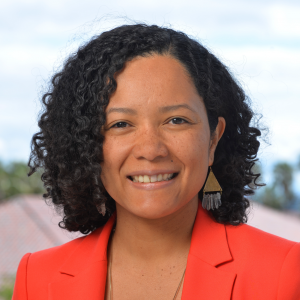Presented By: Aerospace Engineering
Chair's Distinguished Lecture: “Tiny-but-tough” Gallium Nitride Nanoelectronics for Extreme Harsh Environments
Prof. Debbie G. Senesky, Assistant Professor, Stanford University

Prof. Debbie G. Senesky, Assistant Professor, Stanford University
Gallium nitride (GaN) nanoelectronics have operated at temperatures as high as 1000°C making it a viable platform for robust space-grade (“tiny-but-tough”) electronics and nano-satellites. In addition, there has been a tremendous amount of research and industrial investment in GaN as it is positioned to replace silicon in the billion-dollar (USD) power electronics industry, as well as the post-Moore microelectronics universe. Furthermore, the 2014 Nobel Prize in physics was awarded for pioneering research in GaN that led to the realization of the energy-efficient blue light-emitting diode (LED). Even with these major technological breakthroughs, we have just begun the “GaN revolution.” New communities are adopting this nanoelectronic platform for a multitude of emerging device applications including the following: sensing, energy harvesting, actuation, and communication. In this talk, we will review and discuss the benefits of GaN’s two-dimensional electron gas (2DEG) over silicon’s p-n junction for space exploration applications (e.g., radiation-hardened, temperature-tolerant Venus probes). In addition, we will discuss recent results that advance this nanoelectronic device platform for extreme-environment Internet-of-things (IoT) systems for combustion and down-hole monitoring.
Short Bio:
Prof. Debbie G. Senesky is an Assistant Professor at Stanford University in the Aeronautics and Astronautics Department and by courtesy, the Electrical Engineering Department. In addition, she is the Principal Investigator of the EXtreme Environment Microsystems Laboratory (XLab). Her research interests include the development of nanomaterials for extreme harsh environments, high-temperature electronics, and robust instrumentation for Venus exploration. In the past, she has held positions at GE Sensing (formerly known as NovaSensor), GE Global Research Center, and Hewlett Packard. She received the B.S. degree (2001) in mechanical engineering from the University of Southern California. She received the M.S. degree (2004) and Ph.D. degree (2007) in mechanical engineering from the University of California, Berkeley. Prof. Senesky recently chaired the 2018 Women in Aerospace Symposium (WIA2018) at Stanford University. She has served on the technical program committee of the IEEE International Electron Devices Meeting (IEEE IEDM), International Conference on Solid-State Sensors, Actuators, and Microsystems (Transducers), and International Symposium on Sensor Science (I3S). She is currently the co-editor of three technical journals: IEEE Electron Device Letters, Sensors, and Micromachines. In recognition of her research, she received the Emerging Leader Abie Award from AnitaB.org in 2018, Early Faculty Career Award from the National Aeronautics and Space Administration (NASA) in 2012, Gabilan Faculty Fellowship Award in 2012, and Sloan Ph.D. Fellowship from the Alfred P. Sloan Foundation in 2004.
Gallium nitride (GaN) nanoelectronics have operated at temperatures as high as 1000°C making it a viable platform for robust space-grade (“tiny-but-tough”) electronics and nano-satellites. In addition, there has been a tremendous amount of research and industrial investment in GaN as it is positioned to replace silicon in the billion-dollar (USD) power electronics industry, as well as the post-Moore microelectronics universe. Furthermore, the 2014 Nobel Prize in physics was awarded for pioneering research in GaN that led to the realization of the energy-efficient blue light-emitting diode (LED). Even with these major technological breakthroughs, we have just begun the “GaN revolution.” New communities are adopting this nanoelectronic platform for a multitude of emerging device applications including the following: sensing, energy harvesting, actuation, and communication. In this talk, we will review and discuss the benefits of GaN’s two-dimensional electron gas (2DEG) over silicon’s p-n junction for space exploration applications (e.g., radiation-hardened, temperature-tolerant Venus probes). In addition, we will discuss recent results that advance this nanoelectronic device platform for extreme-environment Internet-of-things (IoT) systems for combustion and down-hole monitoring.
Short Bio:
Prof. Debbie G. Senesky is an Assistant Professor at Stanford University in the Aeronautics and Astronautics Department and by courtesy, the Electrical Engineering Department. In addition, she is the Principal Investigator of the EXtreme Environment Microsystems Laboratory (XLab). Her research interests include the development of nanomaterials for extreme harsh environments, high-temperature electronics, and robust instrumentation for Venus exploration. In the past, she has held positions at GE Sensing (formerly known as NovaSensor), GE Global Research Center, and Hewlett Packard. She received the B.S. degree (2001) in mechanical engineering from the University of Southern California. She received the M.S. degree (2004) and Ph.D. degree (2007) in mechanical engineering from the University of California, Berkeley. Prof. Senesky recently chaired the 2018 Women in Aerospace Symposium (WIA2018) at Stanford University. She has served on the technical program committee of the IEEE International Electron Devices Meeting (IEEE IEDM), International Conference on Solid-State Sensors, Actuators, and Microsystems (Transducers), and International Symposium on Sensor Science (I3S). She is currently the co-editor of three technical journals: IEEE Electron Device Letters, Sensors, and Micromachines. In recognition of her research, she received the Emerging Leader Abie Award from AnitaB.org in 2018, Early Faculty Career Award from the National Aeronautics and Space Administration (NASA) in 2012, Gabilan Faculty Fellowship Award in 2012, and Sloan Ph.D. Fellowship from the Alfred P. Sloan Foundation in 2004.